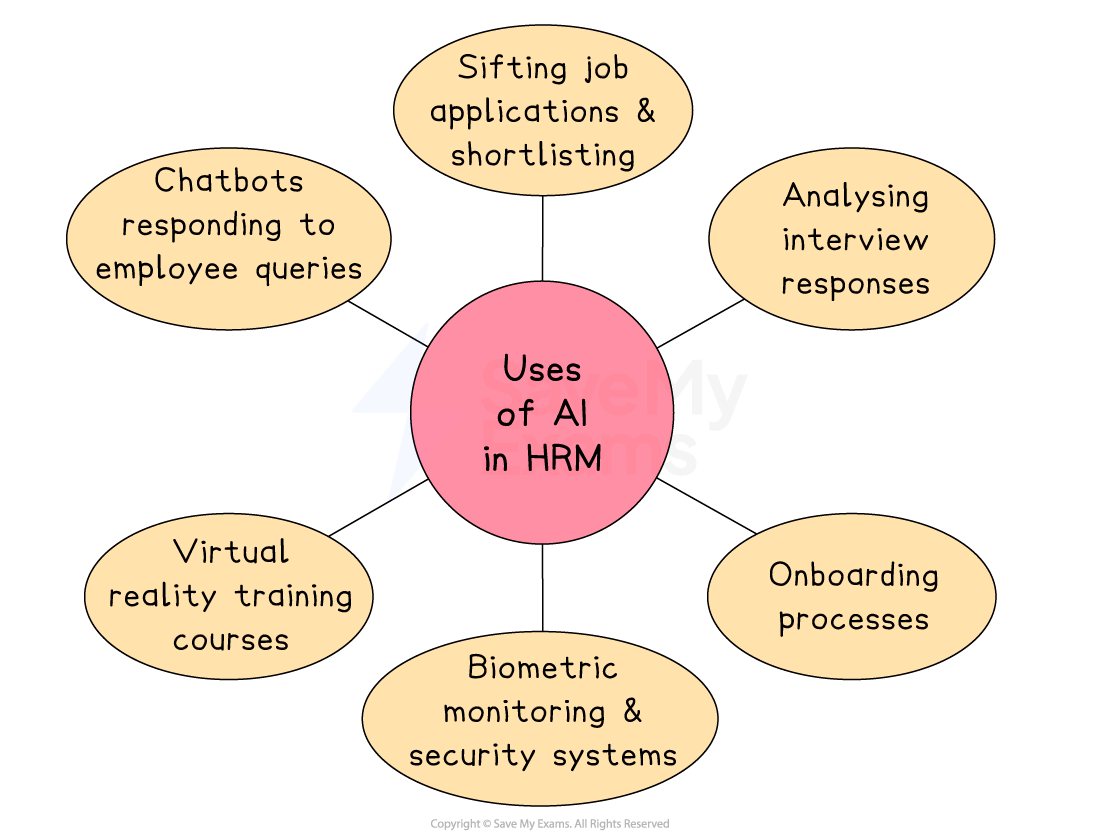Information Technology and Artificial Intelligence in HRM (Cambridge (CIE) A Level Business): Revision Note
Exam code: 9609
The use of IT in HRM
Information technology (IT) is increasingly used to automate processes in HRM such as:
Record keeping
Keeping employee details
Holding training and appraisal documents
Storing tax and pension records
Scheduling
Planning shifts
Monitoring periods of leave
Prioritising tasks
Recruitment
Online job advertisements, including the use of social media
Electronic application submission
Training
E-learning training modules
Online assessments
Remote training sessions using videoconferencing software
Performance management
Performance capture using monitoring software
Online appraisal meetings
Email distribution of performance targets
Implications of using IT in HRM processes
Implication | Explanation |
|---|---|
Saves time |
|
Employee concerns |
|
Communication between managers and subordinates |
|
The use of artificial intelligence in HRM
Artificial intelligence (AI) is the ability of a computer or robot to perform tasks commonly carried out by human beings due to their complexity
AI is expected to have a significant impact on HRM processes
Recent research suggests that in larger businesses AI is already widely used in HRM processes, including employee records management, payroll processing, recruitment, performance management and onboarding new employees
The use of AI in HRM processes

Sifting job applications and shortlisting
AI can be used to swiftly review the contents of job applications and determine which meet the requirements of the job description and person specification without bias and determine which candidates should be invited to an interview
Analysing interview responses
Recordings of responses to interview questions can be analysed using AI to determine which are aligned most closely with business values
In real time, AI can even be used to suggest suitable follow-up questions within an interview
Onboarding
AI can be used to automate processes before a successful candidate begins working for a business, such as
Responding to employee questions
Verifying employee documents
Handling administrative tasks such as providing IDs and access to company hardware and software
Conducting induction training
Biometric monitoring and security systems
Tools such as fingerprint scanning and facial recognition can be used alongside AI tools to control processes such as access to physical premises and IT equipment as well as monitoring attendance
Virtual reality training
Virtual reality software uses AI to create environments that respond to trainee actions and choices, providing realistic and tailored interactive training
Chatbots responding to employee queries
Chatbots that respond to frequently-asked questions related to aspects such as pay, paid leave and employee benefits can increase the amount of time HR managers have to spend on strategic elements of their role
Examiner Tips and Tricks
You will not be required to demonstrate extensive knowledge of specific IT or AI tools used by HRM
However, you may be required to analyse the impact of the increased use of these developments on those who work in HRM, or on workers interacting with automated processes
Future developments in IT and AI in HRM
Sharper forecasting
More accurate models will predict skill gaps and ideal training paths years ahead
Ethical AI controls
New regulations will require transparent explanations of AI decisions and regular bias checks
Well-being analytics
Real-time monitoring of workload and feedback could identify stress and burnout before absence levels rise
Generative-AI learning coaches
On-demand micro-lessons tailored to each employee’s questions
HR 'super-apps'
A single mobile platform for payslips, rota swaps, feedback, coaching and mental-health support
Virtual-reality induction
Immersive tours and simulated practice tasks for new starters before their contract begins

Unlock more, it's free!
Was this revision note helpful?
